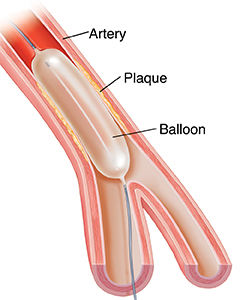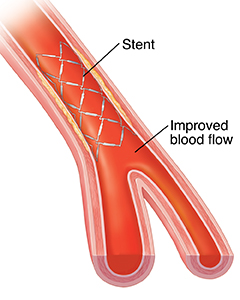Nonsurgical Treatment Options for Heart Attack
Not everyone who has had a heart attack needs open heart surgery, such as a bypass operation. A procedure known as angioplasty with coronary artery stenting can help unblock arteries. It's also known as percutaneous coronary intervention (PCI). People can also do well with just medicine, gradual exercise, and healthy lifestyle changes. These different types of treatment can help you manage heart problems and prevent another heart attack:
Angioplasty and coronary artery stenting
A heart attack can happen as a result of a narrowed or blocked artery. This prevents oxygenated blood from reaching all the areas of the heart. Sometimes, the artery can be opened up with a procedure called angioplasty. While this is not a surgery and typically does not require anesthesia, it is still considered a minimally invasive procedure.
Angioplasty involves inserting a small hollow tube into or near the blocked artery. A balloon on the end of the tube is inflated. This pushes open the artery walls so that blood flows better. Often, a small mesh tube called a stent is placed inside the artery. It props the artery open and helps keep it from closing up again. Very rarely, during the procedure, a laser or other device is sometimes used to dissolve or cut away artery-clogging plaque.
Medicines
Your healthcare provider may prescribe different types of medicine for you to use after a heart attack. Here’s how commonly prescribed medicines can help:
-
Aspirin and other antiplatelet medicines such as clopidogrel or prasugrel help prevent blood clots from forming .
-
Beta-blockers and angiotensin-converting enzyme (ACE) inhibitors lower blood pressure. Lowering blood pressure decreases the force against which the heart has to work. Beta-blockers can also control irregular heartbeats, promote stronger pumping of the heart, and relieve chest pain.
-
Statins lower blood cholesterol, helping prevent clogged arteries.
-
Nitroglycerin or nitrates help ease chest pain. These medicines dilate the arteries to get better blood flow to the heart muscle. This prevents more injury or damage to the muscle.
Some people decide on their own to stop taking one or more of their medicines a few weeks or months after they get out of the hospital. This is a dangerous mistake and can increase the risk of further damage to the heart or even death. Continuing to take medicines, however, can help you feel better and live longer. Talk with your healthcare provider if you are confused about your medicines, are concerned about cost, or have unpleasant side effects from any medicine. Together, you can work to find a regimen that works for you.
Exercise and lifestyle changes
By making some simple lifestyle changes, you can help improve your heart health and prevent another heart attack:
-
Quit smoking. For those who smoke, this is the most important step. It's never easy, but several things can help: nicotine patches and gum, certain medicines, and group or self-help smoking-cessation programs.
-
Get regular exercise. Walking, for example, can be a great way to help your heart regain its strength. Talk with your healthcare provider to learn safe ways to exercise. Participating in physical activity on a regular basis can also help you control emotions, such as stress or depression, which are common feelings in people who have had a heart attack. You may be a candidate for a cardiac rehabilitation program. Talk to your healthcare provider about an exercise plan that's right for you.
-
Eat a heart-healthy diet. Choose foods low in saturated fat, trans fat, cholesterol, and sodium. Include several daily servings of fruits, vegetables, and whole grains. The American Heart Association recommends that people with heart disease eat fish at least twice a week or take fish oil capsules with their healthcare provider’s approval. This type of eating plan can help you control your weight, blood cholesterol, and blood pressure. Your healthcare provider can help you plan a diet that includes your favorite foods.
-
Weight management. If you are overweight or obese, your healthcare provider will work with you to help you lose weight and lower your BMI (body mass index) to a normal or near-normal level. Making diet changes and increasing physical activity can help. Losing weight can improve your risk of high blood pressure, diabetes, and heart disease.
-
Stress. Learn stress-management techniques to help you deal with stress in your home and work life. Reducing your stress load will decrease how hard your heart has to work.
With the right treatment and healthy changes in lifestyle, you can reduce your chance of having a second heart attack. You’ll worry less and feel better. Those are benefits worth working for.
Medical Reviewers:
- Callie Tayrien RN MSN
- Robyn Zercher FNP
- Stacey Wojcik MBA BSN RN

